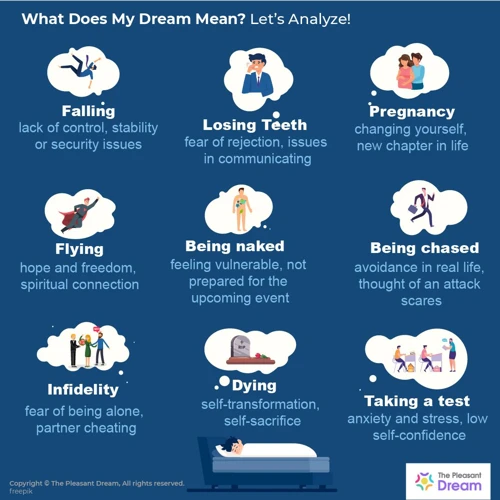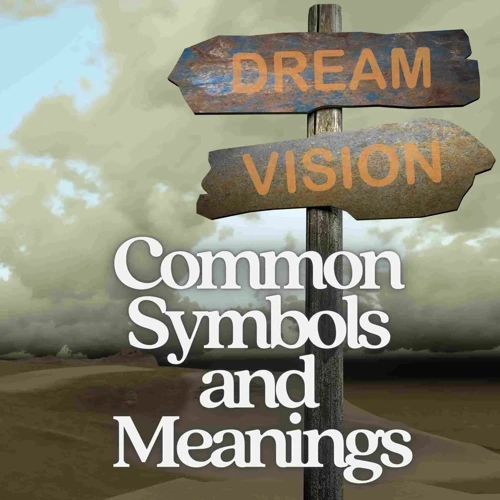Imagine entering a mysterious realm where the boundaries of reality dissolve, where you can embark on extraordinary adventures or encounter the deepest fears of your subconscious mind. This ethereal realm is none other than the world of dreams. Dreams have fascinated and perplexed humanity since ancient times, and understanding their meaning and significance has become an enduring quest. In this comprehensive guide, we will unravel the captivating mysteries of dreams and provide you with step-by-step insights into understanding and interpreting them. So, fasten your seatbelt and get ready for a mind-bending journey through the realm of dreams.
The Importance of Dreams

Dreams hold a profound importance in our lives, serving as a portal into our subconscious mind and offering us a glimpse into our deepest desires, fears, and emotions. They have long been regarded as a window to our unconscious thoughts and feelings. Dreams can provide valuable insights, allowing us to tap into our creativity, problem-solving abilities, and even uncover hidden truths about ourselves. The interpretations of dreams have been a subject of fascination for centuries, and countless cultures and civilizations have ascribed significance and meaning to the symbols and narratives that unfold during sleep. The study of dreams, known as oneirology, continues to intrigue and captivate both scientists and dream enthusiasts alike. Understanding the importance of dreams is key to unlocking their potential for self-discovery, personal growth, and even predicting future events. So, dive into the depths of your dream world and explore the boundless possibilities that await you.
Types of Dreams

Dreams come in various forms, each offering a unique experience and insight into our inner world. Lucid dreaming is a type of dream where the dreamer becomes aware that they are dreaming, allowing them to actively participate and manipulate the dream environment. It can be an exhilarating and empowering experience, giving individuals the ability to explore their imagination and fulfill their wildest fantasies. On the other end of the spectrum, we have nightmares, which can be intensely vivid and disturbing dreams that evoke fear, anxiety, or terror. Nightmares can leave the dreamer feeling unsettled upon waking, but they can also provide an opportunity for personal growth and facing inner fears. Another type of dream is the recurring dream, where the same or similar dream occurs repeatedly. These dreams often carry deep symbolism and reflect unresolved issues or patterns in our lives. Whether you find yourself soaring through the skies, confronting your deepest fears, or trapped in a recurring loop, each type of dream offers a unique avenue for exploration and self-discovery. So embrace the world of dreams and unravel the hidden messages they hold.
Lucid Dreaming
In the realm of dreams, there exists a fascinating phenomenon known as lucid dreaming. Lucid dreaming is a state in which the dreamer becomes aware that they are dreaming while still immersed in the dream itself. This awareness allows individuals to have a certain level of control and influence over their dream experiences. Imagine being able to fly through the sky, explore exotic landscapes, or even interact with fascinating characters, all within the confines of your vivid dream world. Lucid dreaming opens up a realm of limitless possibilities and offers a unique opportunity for self-discovery and exploration. It also allows individuals to engage in creative practices, experiment with new ideas, and overcome fears and anxieties in the safe confines of their dreams. Lucid dreaming is a skill that can be developed through various techniques such as reality checks, dream journaling, and visualization exercises. So, if you’re ready to venture into the realm of lucid dreams and unlock the power of your subconscious mind, be prepared for an extraordinary journey of self-discovery and exhilarating adventures.
Nightmares
Nightmares, the haunting visions that disrupt our sleep, are an intriguing aspect of the dream world. These vivid and often terrifying dreams can leave us feeling shaken, anxious, and afraid. Nightmares delve into the depths of our fears and anxieties, reflecting the subconscious struggles we may be facing in our waking lives. While they may be unsettling to experience, nightmares can serve as a valuable source of self-reflection and personal growth. Exploring the symbolism and emotions within nightmares can lead to a deeper understanding of our underlying fears and help us confront and overcome them. By addressing the root causes of our nightmares, we can reclaim a sense of empowerment and transform these unsettling dreams into opportunities for healing and self-discovery. So, dare to delve into the realm of nightmares and unlock the hidden messages they hold.
Recurring Dreams
Recurring dreams are a fascinating phenomenon that can leave us pondering their significance. These are dreams that occur repeatedly over a period of time, featuring similar themes, situations, or imagery. They often leave a lasting impression and can evoke strong emotions or feelings. While the exact meaning of recurring dreams can vary from person to person, they often symbolize unresolved issues, persistent worries, or unresolved emotions in our waking lives. Perhaps a recurring dream is your mind’s way of highlighting a particular aspect of your life that needs attention or resolution. Exploring the patterns and symbols within these dreams can offer valuable insights and guidance towards personal growth and self-discovery. So, pay attention to these persistent dreams, as they may hold the key to unlocking hidden truths about yourself and your subconscious mind.
Common Dream Symbols

Dreams are like a treasure trove of symbols that hold hidden meanings and messages within them. These symbols can range from animals to water to even the concept of death. Each symbol carries its own unique significance, deeply rooted in the realm of the subconscious mind. Animals in dreams often represent aspects of ourselves or the world around us, with their qualities and behaviors serving as guides or warnings. Water, on the other hand, can symbolize emotions, purification, or the ebb and flow of life. Death, although unsettling, is often seen as a symbol of transformation or the end of a certain phase in life. Each dream symbol holds a rich tapestry of interpretations and associations, which can be unraveled through the practice of dream analysis. By deciphering the symbols that emerge in our dreams, we can gain a deeper understanding of ourselves and the hidden truths that lie beneath the surface. So, dive into your dream world and unlock the secrets that these symbols hold. If you’re interested, you can read more about /words-about-dream/ to delve further into the world of dream symbolism.
Animals
Animals are incredibly common symbols in dreams, often representing different aspects of our personality, emotions, or situations in our waking life. Each animal carries its own unique symbolism and can convey messages about our instincts, desires, or the need for certain qualities in our lives. For example, a dream about a lion may represent courage, dominance, or leadership, while a dream about a butterfly could symbolize transformation, growth, or lightness. Exploring the meaning behind animal symbolism in dreams can offer valuable insights into our inner world and help us connect with our primal instincts. So, the next time you encounter an animal in your dreams, pay attention to its characteristics and behaviors, as they may hold powerful messages for your waking life.
Water
Water, a powerful symbol that flows through our dreams, carries with it a myriad of interpretations. Its presence in our dreams often represents the subconscious mind, emotions, and the depths of our psyche. The state of the water, whether calm or turbulent, can reflect the state of our emotions. Crystal clear water may indicate clarity and purity, while murky or dirty water may point to confusion or unresolved emotions. The context and surroundings of the water in our dreams also play a significant role in deciphering its meaning. Are we swimming in calm waters or being engulfed by a raging sea? Exploring the symbolism of water in our dreams can provide valuable insights into our emotional well-being, relationships, and personal growth. So, dive into the depths of your dream world and uncover the hidden messages that lie within the flowing currents.
Death
Dreams involving death are often met with a potent mix of curiosity and unease. In the realm of dreams, death symbolism does not necessarily represent literal physical death, but rather signifies transformation, change, or the end of a particular phase in one’s life. These dreams may be indicative of the need for personal growth, letting go of past burdens, or embracing new beginnings. The interpretations of death in dreams are highly subjective and can vary based on individual experiences and cultural beliefs. Exploring the symbolism and emotions associated with death dreams can provide valuable insights into our subconscious thoughts and emotions, ultimately guiding us towards personal transformation and self-understanding. So, dare to delve into the darker corners of your dreamscapes and unravel the mysteries that lie within this enigmatic symbol.
Interpretation Techniques

Interpreting dreams is an art that requires a combination of techniques to unravel their hidden meanings. One of the most effective and widely used techniques is journaling. By keeping a dream journal, you can capture the intricate details of your dreams, including symbols, emotions, and storylines. Analyzing these elements can provide invaluable insights into your subconscious mind. Another powerful technique is symbol analysis, where you explore the significance of common symbols that appear in your dreams. Symbols such as animals, water, or death can have deep personal and cultural meanings, and decoding their symbolism can offer profound revelations. Trusting your intuition and personal associations is yet another method for dream interpretation. By tapping into your own feelings and connections to certain symbols or events in your dreams, you can uncover unique meanings that are specific to you. So, embrace these interpretation techniques and embark on the captivating journey of decoding the secret language of your dreams.
Journaling
Journaling is a powerful tool in the realm of dream interpretation, allowing us to capture and document the intricate details of our dreams. By consistently writing down our dreams in a dedicated dream journal, we create a tangible record that we can reference and reflect upon later. This process helps to enhance our dream recall and encourages a deeper connection with our dreams. When journaling our dreams, it’s important to focus on the specific symbols, emotions, and experiences we encountered during the dream. By dissecting and analyzing these elements, we can begin to unravel the hidden messages and meanings behind our dreams. Journaling also enables us to track recurring patterns and themes in our dreams, providing valuable insights into our subconscious mind. Through the act of writing, we engage both the logical and creative parts of our brain, bridging the gap between our dreams and waking life. So, grab a pen and a journal, and embark on a journey of self-discovery through the power of dream journaling.
Symbol Analysis
Symbol analysis is a fascinating and powerful technique for interpreting dreams, as symbols often hold layers of meaning that can provide valuable insights into our subconscious. When conducting a symbol analysis, it is important to consider both personal and universal symbolism. Personal symbolism refers to the unique associations and experiences we have with certain symbols, while universal symbolism pertains to symbols that hold consistent meaning across cultures and contexts. By examining the symbols present in our dreams, we can uncover hidden emotions, desires, and unresolved issues. For example, dreaming of water may symbolize purification and cleansing, while dreaming of animals could represent our instincts or primal nature. By delving into the depths of symbolism, we can gain a deeper understanding of ourselves and the messages our dreams are trying to convey. So, grab your dream journal and embark on a journey of symbol analysis to unravel the mysteries that lie within.
Intuition and Personal Associations
When it comes to interpreting dreams, intuition and personal associations play a significant role. Your intuition is a powerful tool that can guide you in deciphering the meaning behind the symbols and narratives that unfold in your dreams. Trusting your gut instincts and tapping into your inner wisdom can lead to valuable insights and a deeper understanding of your dream’s significance. Additionally, personal associations are unique to each individual. Certain symbols or themes within your dreams may hold personal meanings based on your past experiences, beliefs, and emotions. For example, dreaming about winning the lottery may symbolize abundance and financial success for someone who associates the lottery with wealth and fortune. However, it may hold a different meaning for someone who associates the lottery with chance or risk-taking. Paying attention to your intuition and personal associations can enhance your dream interpretation process and provide you with a more nuanced understanding of the messages your dreams are conveying.
Dreams and Emotions

Dreams have a profound connection to our emotions, acting as a conduit for the expression and exploration of our innermost feelings. During sleep, the subconscious mind takes center stage, unearthing and processing emotions that may be buried or overlooked in our waking lives. Dreams can elicit a wide range of emotions, from joy and excitement to fear and sadness. They offer a unique opportunity to experience and process these emotions in a safe and imaginative environment. Dreams allow us to confront unresolved conflicts, confront our fears, and navigate complex emotions that may be challenging to address in our conscious state. By paying attention to the emotional landscape of our dreams, we gain valuable insights into our emotional well-being and can use this awareness for personal growth and healing. So, embrace the rollercoaster of emotions that unfold in your dreams and let them guide you on a path of self-discovery.
Using Dreams for Personal Growth

Our dreams have the power to guide us on a path of personal growth and self-discovery. Within the realms of our subconscious mind, dreams can offer valuable insights, allowing us to uncover hidden aspects of ourselves, confront unresolved emotions, and gain a deeper understanding of our desires and fears. Through self-reflection and awareness, we can use our dreams as a tool for personal growth. Dreaming can provide a safe space to explore and process our emotions, offering a unique opportunity for introspection and healing. Whether it’s unraveling the symbolism of a dream about water or deciphering the meaning behind a dream about death, each dream holds a wealth of significance that can serve as a catalyst for personal transformation. By paying attention to our dreams, recording them in a dream journal, and analyzing their symbols and messages, we can tap into a potent source of wisdom that can guide us on our journey towards self-improvement. Embrace the power of your dreams and unlock the potential for profound personal growth that lies within them.
Self-Reflection and Awareness
Self-reflection and awareness are fundamental aspects of personal growth and understanding. When we delve into the realm of dreams, we open up a doorway to exploring our innermost thoughts, emotions, and experiences. Dreams allow us to reflect on our daily lives, relationships, and ambitions, giving us a deeper understanding of our true selves. By paying attention to the symbols, themes, and emotions present in our dreams, we can gain valuable insights into our subconscious desires and fears. Through self-reflection and awareness, we can unlock the hidden messages and meanings that our dreams hold, guiding us towards self-discovery and personal transformation. So, take the time to reflect on your dreams and embrace the opportunity to gain a deeper understanding of yourself and your inner world.
Problem Solving
Problem solving is another powerful aspect of dreams. Our dreams can provide unique perspectives and insights that can aid in overcoming challenges and finding solutions to real-life problems. When we dream, our minds are free from the constraints of logic and rationality, allowing for a more holistic and imaginative approach to problem-solving. Dreams can present us with metaphorical scenarios or symbols that reflect the underlying issues we face in our waking lives. By analyzing and interpreting these dream symbols, we can gain new perspectives, uncover hidden obstacles, and explore potential solutions. The subconscious mind has a remarkable ability to connect seemingly unrelated concepts and ideas, which can lead to innovative problem-solving strategies. So, the next time you encounter a difficult problem or decision, pay attention to your dreams. They may hold the key to unlocking the answers you seek.
Creative Inspiration
Creative inspiration often strikes when we least expect it, and dreams have a unique ability to ignite the creative spark within us. In the realm of dreams, our imagination knows no bounds, and we are free to explore fantastical landscapes, interact with intriguing characters, and experience extraordinary situations. Many artists, writers, musicians, and inventors have credited their dreams as a wellspring of innovative ideas and breakthroughs. In the depths of slumber, our subconscious mind weaves together fragments of memories, emotions, and images, giving rise to new and unconventional connections. These dream-inspired visions can serve as a catalyst for the birth of new artistic endeavors, helping us see the world through a different lens and pushing the boundaries of our imagination. So, embrace the power of your dreams and let them guide you on a remarkable journey of creative exploration.
Dreams in Different Cultures

Dreams have held significant cultural importance throughout history, shaping beliefs and practices in various societies around the world. In Native American cultures, dreams are seen as a spiritual connection and a means of communication with ancestors and spirits. They are often interpreted through rituals and ceremonies to seek guidance and gain insights into personal and collective destinies. In Eastern traditions, such as those found in India and China, dreams are seen as a reflection of the individual’s inner state of being and are used as a tool for self-realization and enlightenment. In Western cultures, dreams have been a subject of exploration and interpretation since ancient times. Sigmund Freud’s psychoanalytic theory brought attention to the significance of dreams in understanding the subconscious mind. Today, dreams continue to spark intrigue and curiosity, with individuals seeking to decipher their meanings and messages. Whether it is a vivid dream about winning the lottery (/dream-about-lottery-numbers/) or a surreal experience of being dead but still alive (/dream-about-being-dead-but-still-alive/), dreams continue to captivate our imagination and provide fascinating insights into the human psyche.
Native American Dream Beliefs
Native American cultures have deeply ingrained beliefs and spiritual practices surrounding dreams. For many Native American tribes, dreams are regarded as sacred communications from the spiritual realm. They believe that dreams provide guidance, messages, and visions that can aid in healing, decision-making, and connecting with the supernatural. Native Americans often engage in rituals and ceremonies to enhance dreaming experiences, such as fasting, purification practices, and vision quests. Dream interpretation in Native American cultures heavily relies on symbolism, animal spirits, and ancestral connections. Each symbol and vision holds unique significance and can be interpreted within the cultural context and personal experiences of the dreamer. These profound dream beliefs and traditions have been passed down through generations, contributing to the rich tapestry of Native American spirituality and wisdom.
Eastern and Western Traditions
Eastern and Western traditions have long held divergent beliefs and interpretations when it comes to dreams. In Eastern cultures, dreams are often seen as a means of communication with the spiritual realm or as a way to receive divine messages. Practices such as dream yoga and meditation are used to induce lucid dreaming and gain insight into one’s subconscious. Eastern dream interpretation often emphasizes symbolism and the interconnectedness of various elements within the dream. On the other hand, Western traditions have often approached dreams from a more psychological perspective. Influenced by the work of Freud and Jung, Western dream analysis looks at the underlying meanings and symbols within dreams as reflections of the dreamer’s psyche. The emphasis here is on personal associations and the exploration of the unconscious mind. While there are cultural differences in the interpretations of dreams, at their core, both Eastern and Western traditions recognize the transformative power and significance of dreams in our lives.
Common Dream Themes

Within the realm of dreams, numerous recurring themes capture our minds and leave us pondering their significance. These common dream themes range from exhilarating experiences of flight and the sensation of falling to the unnerving feeling of being chased or pursued. Another common theme that many individuals experience is the anxiety-inducing scenario of failing an exam or test. Each of these dream themes carries its own symbolism and potential interpretations, reflecting aspects of our waking life and inner psyche. Exploring these common dream themes opens a gateway to understanding our subconscious fears, desires, and challenges. By delving into the symbolism and emotions evoked by these themes, we can gain valuable insights and unravel the deeper meanings hidden within our dreamscape. So, let’s dive into the collective experiences and unravel the mysteries of these common dream themes together.
Flying and Falling
Dreams of flying and falling are among the most common and intriguing experiences we have while asleep. Flying in a dream often symbolizes a sense of freedom, liberation, and empowerment. It can represent a desire for exploration, breaking free from limitations, or gaining a new perspective on life. Falling dreams, on the other hand, can evoke feelings of vulnerability, loss of control, or fear of failure. They may reflect a sense of insecurity, anxiety, or the need to let go of something that is holding you back. The interpretation of these dreams can vary depending on the individual’s personal experiences and emotions. Flying dreams can be seen as a sign of ambition and high aspirations, while falling dreams may indicate a need for grounding or finding stability in your waking life. Pay attention to the emotions and circumstances surrounding these dream experiences to gain deeper insight into their meaning.
Being Chased or Pursued
Being chased or pursued is a common theme in dreams that often evokes feelings of fear, anxiety, and vulnerability. It is a symbolic representation of a sense of being overwhelmed, threatened, or pursued by something in our waking lives. The presence of a pursuer in a dream can reflect unresolved conflicts, unresolved emotions, or unresolved situations that we are avoiding or trying to escape from. This dream theme may also be indicative of a need to confront and address these issues head-on in order to regain a sense of control and power in our lives. Additionally, being chased can symbolize a desire to escape from certain aspects of our personality or certain responsibilities that we find burdensome. It is essential to pay attention to the details and emotions surrounding the chase in order to gain a deeper understanding of the specific message that our subconscious is trying to convey. So, the next time you find yourself being chased in a dream, take a moment to reflect on what you may be running away from in your waking life and consider how you can confront and resolve these challenges.
Failing an Exam or Test
Failing an exam or test in a dream can evoke feelings of anxiety and stress. This common dream theme often reflects insecurities and self-doubt in waking life. It may indicate a fear of failure or a lack of confidence in one’s abilities. However, it’s important to look beyond the literal interpretation of this dream symbol. Failing an exam or test can also signify a missed opportunity or a setback in achieving goals. It may serve as a reminder to reassess your approach, study habits, or preparation methods. Instead of fixating on the fear of failure, use this dream as motivation to identify areas of improvement and develop a more resilient mindset. Don’t let the fear of failing hold you back, but rather see it as an opportunity for growth and learning.
Exploring the Unconscious Mind through Dreams

Exploring the unconscious mind through dreams allows us to delve into the hidden aspects of our psyche that may not be readily accessible during wakeful states. Dreams serve as a pathway to the deeper layers of our thoughts, emotions, and memories, providing a unique opportunity for self-exploration and introspection. As we sleep, our unconscious mind takes the stage, creating vivid and often symbolic scenarios that reflect our innermost desires, fears, and unresolved conflicts. Through dream analysis, we can unravel the underlying meaning behind these symbols and gain insights into our subconscious motivations and beliefs. This process of exploring the unconscious mind can foster self-awareness, emotional healing, and personal growth. By paying attention to the messages our dreams convey, we can tap into a wellspring of wisdom and harness the power of our dreams to guide and inform our waking lives.
Keeping a Dream Journal

Keeping a dream journal is an essential tool for anyone seeking to understand and interpret their dreams. It involves recording your dreams in a journal as soon as you wake up, capturing every detail and emotion while they are still fresh in your mind. By consistently jotting down your dreams, you create a valuable archive that you can refer back to, enabling you to spot patterns, recurring symbols, and themes that may offer valuable insights into your subconscious. The act of writing down your dreams also helps to reinforce your dream recall abilities, making it easier to remember and recall dreams in the future. Your dream journal is a personal and intimate space where you can delve into the rich and mysterious world of your dreams, gaining a deeper understanding of yourself and unraveling the hidden meanings that lie within. So grab a pen and paper, or use a digital journal, and embark on your dream journaling journey today.
Practical Tips for Better Dream Recall

Enhancing dream recall can greatly amplify your ability to analyze and interpret the messages your dreams hold. To improve your capacity to remember your dreams, there are several practical tips you can implement. Firstly, practicing good sleep hygiene, such as getting enough restful sleep and establishing a consistent sleep schedule, can significantly enhance your dream recall. Additionally, setting the intention to remember your dreams before falling asleep and keeping a dream journal by your bedside to jot down any fragments or details immediately upon waking can reinforce your memory of dreams. Engaging in deep reflection and analysis of your dreams can also contribute to better recall in the future. By following these practical tips, you can unlock the vivid tapestry of your dream world and delve deeper into the rich tapestry of your subconscious mind.
Sleep Hygiene
When it comes to enhancing your dream recall and overall dream experience, maintaining good sleep hygiene is essential. Here are some tips to help you improve your sleep hygiene:
- Establish a regular sleep schedule: Try to go to bed and wake up at the same time every day, even on weekends. This helps regulate your body’s internal clock.
- Create a relaxing bedtime routine: Engage in activities that promote relaxation, such as reading a book, taking a warm bath, or practicing mindfulness meditation.
- Create a sleep-friendly environment: Make sure your bedroom is dark, quiet, and at a comfortable temperature. Use blackout curtains, earplugs, or a white noise machine if necessary.
- Avoid electronic devices before bed: The blue light emitted by screens can interfere with your sleep. Try to limit your exposure to electronic devices at least an hour before bedtime.
- Avoid stimulants and heavy meals: Avoid consuming caffeine, nicotine, and large meals close to bedtime, as they can disrupt your sleep.
- Exercise regularly: Engaging in regular physical activity can promote better sleep. However, avoid exercising too close to bedtime, as it can make it harder to fall asleep.
- Create a comfortable sleep environment: Invest in a supportive mattress and comfortable pillows to ensure a restful night’s sleep.
By incorporating these sleep hygiene practices into your daily routine, you can create an optimal environment for deep, rejuvenating sleep and enhance your ability to recall and understand your dreams. Remember, quality sleep sets the stage for vivid and memorable dream experiences.
Awareness and Intention
Becoming aware and setting intentions can greatly enhance your ability to recall and interpret dreams. By cultivating a sense of mindfulness throughout the day, you can extend this awareness into the realm of sleep. One effective technique is to set an intention before going to bed, stating your desire to remember your dreams and gain insight from them. This could be as simple as repeating a phrase, such as “I will remember my dreams tonight,” or visualizing yourself in a dream-like state. Another helpful practice is keeping a dream journal by your bedside, encouraging you to record your dreams immediately upon waking. This act of writing not only reinforces the intention to remember, but also provides a tangible record for later analysis. Additionally, incorporating daily reflection and meditation practices into your routine can help heighten self-awareness and strengthen your connection with your dreams. By approaching your dreams with intention and mindfulness, you can unlock the hidden wisdom they hold.
Recording Techniques
When it comes to recording your dreams, there are various techniques that can help you capture the details and nuances of your dream experiences. One popular technique is keeping a dream journal, where you write down your dreams as soon as you wake up. This method allows you to capture the vividness of your dreams while they are still fresh in your memory. Another technique is voice recording, where you use a voice recorder or a smartphone app to quickly recount your dreams in audio format. This can be especially useful if you prefer speaking rather than writing. Additionally, some people find it helpful to use visual aids, such as drawing or sketching their dream images. These visual representations can provide a vivid and tangible record of your dreams. Whichever recording technique you choose, the key is to find a method that works best for you and ensures that you can easily capture and revisit your dream experiences.
Interpreting Nightmares

Nightmares, those haunting nocturnal terrors that jolt us awake in a state of fear and anxiety, can leave us feeling shaken and disturbed. However, rather than dismiss them as mere products of a restless mind, we can choose to delve deeper into their meaning and unlock valuable insights. Interpreting nightmares involves unraveling the symbolism and emotions embedded within these unsettling dreams. Nightmares often serve as a mirror to our deepest fears and unresolved traumas, offering an opportunity for self-reflection, healing, and growth. By exploring the themes, symbols, and emotions present in our nightmares, we can gain a better understanding of our subconscious mind and confront our fears head-on. Through the process of interpretation, transformation and resolution can take place, leading to a sense of empowerment and a renewed sense of inner peace. So, embrace the challenge of interpreting your nightmares, and uncover the wisdom hidden within the darkest corners of your dreamscape.
Understanding Fear and Anxiety
Understanding fear and anxiety in the context of nightmares is essential for unraveling their deeper meanings. Nightmares often manifest as intense and distressing dreams, filled with fear, terror, or a sense of impending danger. These dreams can be a reflection of unresolved fears and anxieties that we may be experiencing in our waking lives. By analyzing the symbols and scenarios present in nightmares, we can gain valuable insights into our subconscious thoughts and emotions, helping us identify and address the root causes of our fears. Whether it’s confronting a specific phobia, processing past traumas, or overcoming generalized anxiety, delving into the realm of nightmares can offer therapeutic opportunities for personal growth and healing. By bravely diving into the depths of our darkest dreams, we can transform fear and anxiety into sources of strength and empowerment.
Overcoming Nightmares
Overcoming nightmares can be a challenging but essential step toward a more peaceful sleep. Here are some effective strategies to combat these distressing dreams:
1. Identify Triggers: Pay attention to any recurring themes or situations that trigger your nightmares. This awareness can help you better understand the underlying fears or anxieties that contribute to these dreams.
2. Create a Calming Bedtime Ritual: Establish a soothing routine before bed to relax your mind and body. This may include activities such as reading a book, listening to calming music, or practicing deep breathing exercises.
3. Positive Visualization: Before falling asleep, imagine yourself in a safe and peaceful scenario. Visualize positive outcomes and replace any negative or fearful thoughts that may arise.
4. Seek Emotional Support: Sharing your nightmares with a trusted friend, family member, or therapist can provide a valuable space for you to process and understand your fears.
5. Develop Coping Strategies: Explore stress-reducing techniques such as mindfulness, meditation, or gentle exercise to help manage anxiety levels and promote better sleep.
Remember, overcoming nightmares takes time and patience. By implementing these strategies consistently, you can gradually diminish the frequency and intensity of your nightmares, leading to more restful nights and a sense of peace.
Seeking Professional Help
There may be instances when nightmares or unsettling dreams become overwhelming and affect your daily life. In such cases, it may be beneficial to seek professional help. Consulting with a qualified therapist or psychologist who specializes in dream analysis can provide valuable insights and support in understanding and dealing with the underlying issues that may be causing these distressing dreams. They can help you explore the emotional and psychological aspects of your dreams in a safe and supportive environment, allowing you to gain a deeper understanding of yourself and work towards resolving any underlying concerns. Professional help can provide guidance and techniques to cope with nightmares, manage anxiety, and promote better sleep hygiene. Remember, seeking professional help is a courageous step towards reclaiming your peace of mind and well-being.
Common Dream Questions Answered
As we journey into the enigmatic realm of dreams, it is only natural that questions arise regarding their purpose, nature, and potential. In this section, we aim to shed light on some of the most common and intriguing questions about dreams. Why do we dream? Can dreams predict the future? Are dreams universal? While the answers to these questions may not be definitive, exploring the various theories and beliefs surrounding them can offer fascinating insights into the complexities of the dream world. Delve into these answers as we unravel the mysteries of dreams and uncover the fascinating connections between the unconscious mind and our waking reality. So, let’s embark on a quest for knowledge and unravel the enigma that is the world of dreams.
Why Do We Dream?
There are several theories that attempt to explain the intriguing question of why we dream. These theories provide different perspectives on the purpose and function of dreams. One theory suggests that dreams serve as a way for our brains to process and consolidate memories, helping us retain important information and discard irrelevant details. Another theory proposes that dreams act as a tool for problem-solving, allowing us to work through challenging situations and find creative solutions. Some psychologists believe that dreams provide a platform for wish fulfillment, allowing us to explore our deepest desires and fantasies. Another fascinating theory suggests that dreams serve as a mechanism for emotional regulation, helping us process and cope with intense emotions and experiences. While the exact purpose of dreams remains a topic of debate, it is clear that they play a significant role in our psychological well-being and understanding them can provide valuable insights into our inner world.
Can Dreams Predict the Future?
Can dreams truly predict the future? This age-old question has fascinated humanity for centuries. While dreams often contain symbolic and metaphorical elements, some individuals claim to have experienced precognitive dreams that seemingly foretold future events. These dreams can range from mundane occurrences like running into an old friend to more significant events such as natural disasters or winning the lottery. However, the scientific community remains divided on the matter. Skeptics argue that dream predictions are nothing more than coincidences or retrospective reinterpretations of vague dream impressions. On the other hand, proponents of precognition believe that dreams tap into a higher consciousness or collective unconscious, allowing glimpses into future possibilities. Whether one is a skeptic or a believer, the question of dreams predicting the future still lingers, leaving room for personal interpretation and speculation.
Are Dreams Universal?
Are dreams universal, transcending cultural and societal boundaries? This question has fascinated scholars and researchers for years. While the specific symbols and interpretations may vary across cultures, the experience of dreaming appears to be a shared human phenomenon. Regardless of geographical location or cultural background, humans have reported having dreams throughout history. From ancient civilizations to modern-day societies, dreams have been an integral part of human existence. While the content and themes of dreams may differ based on cultural influences and personal experiences, the act of dreaming itself seems to be a universal aspect of the human condition. So, whether you find yourself exploring the dreamscapes of ancient civilizations or delving into the rich tapestry of your own dreams, remember that the experience of dreaming is something that connects us all.
Conclusion
In conclusion, dreams are a fascinating and complex phenomenon that has intrigued humanity for centuries. They hold immense importance in our lives, serving as a gateway to our subconscious mind and providing insights into our emotions, desires, and fears. Through the process of understanding and interpreting dreams, we can unlock a deeper understanding of ourselves and gain valuable insights for personal growth and self-reflection. Whether exploring the symbolic meanings of common dream motifs or delving into the depths of our unconscious mind, dreams offer a rich tapestry of experiences and knowledge. So, embrace the enigmatic world of dreams, keep a dream journal, and allow your nighttime adventures to guide you on a journey of self-discovery and enlightenment.
Frequently Asked Questions
Why do we dream?
The exact purpose of dreaming is still a subject of scientific debate. However, theories suggest that dreams may serve various functions, such as processing emotions, consolidating memories, problem-solving, and providing a safe space for wish fulfillment.
Can dreams predict the future?
While dreams can sometimes seem prophetic or coincidentally align with real-life events, there is no scientific evidence to suggest that dreams can predict the future. Dreams are more likely a reflection of our thoughts, emotions, and experiences.
Are dreams universal?
Dreams are experienced worldwide, but the content and symbolism of dreams can vary across cultures. Cultural, personal, and individual differences can influence the themes, symbols, and interpretations of dreams.
How can I improve dream recall?
Improving dream recall can be achieved through practices such as keeping a dream journal, setting the intention to remember dreams before sleep, establishing a consistent sleep routine, and creating a peaceful sleep environment.
What does it mean if I have recurring dreams?
Recurring dreams often indicate unresolved issues, fears, or patterns in our lives that require attention. These dreams serve as a message from our subconscious, urging us to address and resolve these underlying concerns.
How can I interpret dream symbols?
Interpreting dream symbols involves exploring personal associations, cultural contexts, and emotions connected to specific symbols. Symbol analysis, self-reflection, and journaling can help uncover the significance of symbols within the unique context of your dreams.
Why do some people have lucid dreams?
Lucid dreams occur when a person becomes aware that they are dreaming while still within the dream itself. Some individuals naturally experience more frequent lucid dreams, while others can learn techniques to increase their likelihood, such as reality checks, dream journaling, and visualization exercises.
Can nightmares have a positive meaning?
Nightmares are often associated with negative emotions and fears. However, they can sometimes serve as a catalyst for personal growth, highlighting unresolved issues or warning signals that require attention. By facing and resolving the underlying causes, nightmares can lead to positive transformations.
Is it possible to control my dreams?
Lucid dreaming techniques can allow individuals to exert some level of control and influence over their dreams. Techniques such as reality checks, meditation, and visualization can enhance the likelihood of experiencing lucid dreams, where the dreamer can actively participate and shape the dream narrative.
How can I overcome recurring nightmares?
Overcoming recurring nightmares typically involves identifying and addressing the root causes, such as trauma, anxiety, or stress. Techniques such as relaxation exercises, imagery rehearsal therapy, and seeking professional help can aid in reducing the frequency and intensity of nightmares.







